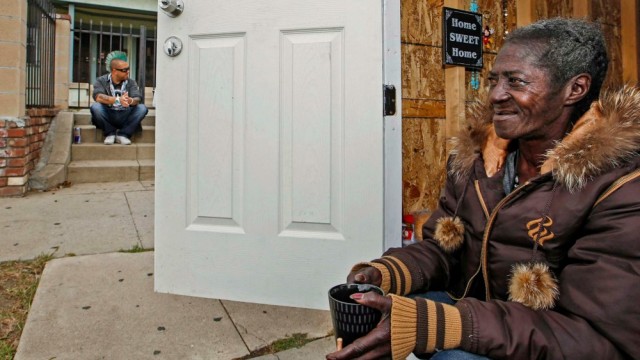
In a monumental show of violent power, the LA government is destroying the tiny homes of formerly homeless people. This leads to the question, “without the government who is going to keep the homeless, homeless?”
Before we delve into the catastrophic actions by the City of LA, here are some examples of amazing human beings who created tiny homes for homeless people
Homeless man in LA receives a tiny house
California Man Builds Tiny House for Homeless Woman Sleeping in Dirt
Though a rational and loving human being could be brought to tears by looking at these examples, the LA government has found it necessary to ensure that these people stay homeless.
As Reported by the LA Times:
“Escalating their battle to stamp out an unprecedented spread of street encampments, city officials have begun seizing tiny houses from homeless people living on freeway overpasses in South Los Angeles.
Three of the gaily painted wooden houses, which come with solar-powered lights and American flags, were confiscated earlier this month and seven more are planned for impound Thursday, a Bureau of Sanitation spokeswoman said.
Elvis Summers, who built and donated the structures, was out Wednesday with a flat-bed trailer, trying to move houses scattered up and down Harbor Freeway bridges into storage.
“These people are beaten down so hard, you give them any opportunity to be normal, it lifts them up,” Summers said.
The houses were removed as part of a street cleanup requested by the office of CouncilmanCurren Price, who represents the neighborhood, sanitation spokeswoman Elena Stern said.
The three houses taken in early February are being stored on a city equipment lot but ultimately will be destroyed, Stern added.
Some advocates for the homeless see the wooden, single-room structures — each about the size of a parking spot — as a simple and safer alternative to having the homeless sleep on the sidewalks.
Mayor Eric Garcetti‘s spokeswoman, Connie Llanos, said he is committed to getting homeless people into permanent and not makeshift housing.
“Unfortunately, these structures can be hazardous to the individuals living in them and to the community at large,” Llanos said in a statement on the mayor’s behalf.
“When the city took the houses, they didn’t offer housing, they straight kicked them out,” Summers said.
Faced with public outcry over the camps, the city last year passed a tough new sweeps ordinance, but is continuing to discuss protocols and possible modifications. A plan to end homelessness over the next decade was also adopted, but officials are struggling to identify money to tackle the $2-billion problem.
Summers said he has built and placed 37 tiny houses from Van Nuys to Inglewood, with help from volunteers and more than $100,000 in donations from people around the world drawn to his online video campaign.
“I’m just so angry right now,” Summers said, adding seized houses should “default” to him rather than be destroyed.
Kenner Jackson, who lives in a tiny house with his wife, Becky, and terrier, Cowboy, said officials were “taking houses from people who need them right now. … Their plan isn’t anything.”
Jackson said he didn’t know where they would go if their house is taken Thursday. “This is our foundation,” he said.
Jackson said the city hauled away homeless people’s possessions while leaving bulky items like mattresses and chairs that residents dump next to the freeway.
Johnny Horton, 60, whose heavily bandaged legs were scored with wounds from uncontrolled diabetes, wept silently Wednesday as he contemplated going back to sleeping in the street.
“Laying on that tent on the sidewalk it’s impossible to keep clean,” Horton said. He said the staff at the Los Angeles County-USC Medical Center, which discharged him Tuesday, said they’d try to get him housing, but it would take one to three months.
“I grew up in this neighborhood,” Horton said.
Posted on Julia Briggs Cannon’s tiny house next to the city impound notice were several fliers seeking the whereabouts of her husband, Larry Joe Cannon.
Cannon, 58, said her husband, a Vietnam-era Marine veteran with post-traumatic stress disorder and memory loss, was hospitalized with a seizure Feb. 5, then disappeared.







this is why I bailed out of Calif. idiot laws and no compassion for the people. Police that write tickets for anything and everything. Most are more crooked then the people they arrest. !!!!!!!
Karma will be a bitch when it comes knocking….